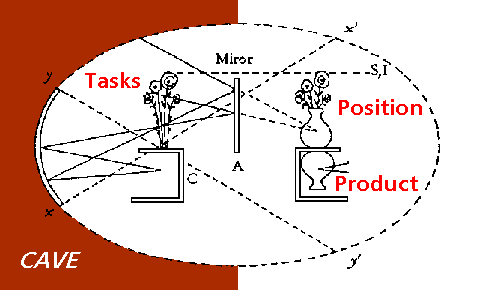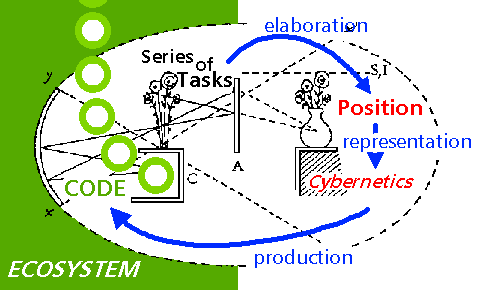![]() This
(schema below) is the usual 'quadripart' model that
one can find at the beginning of the
Industrial Age - which is showing there the places of the
work activities (a collection
of tasks which defined the slaves in Plato's
cave... every one knows this for thousands of years!) -
and how they are reflected as
position, or values at
the work place and in the society.
This
(schema below) is the usual 'quadripart' model that
one can find at the beginning of the
Industrial Age - which is showing there the places of the
work activities (a collection
of tasks which defined the slaves in Plato's
cave... every one knows this for thousands of years!) -
and how they are reflected as
position, or values at
the work place and in the society.
![]() These positions
(also called Significand) represent a
product. This product may be a simple
product, a machine, a robot, or even an
objectified worker.
These positions
(also called Significand) represent a
product. This product may be a simple
product, a machine, a robot, or even an
objectified worker.
 ideology
ideology
![]() This stage
of development falls into politics, academics,
religion.
This stage
of development falls into politics, academics,
religion.
![]() But a happy
outcomes happens, when the product becomes so sophisticates that it turns
out to become itself a consumer (that is
the fourth place of the model).
But a happy
outcomes happens, when the product becomes so sophisticates that it turns
out to become itself a consumer (that is
the fourth place of the model).
![]() This 'turning'
principle is know as a semantic process.
It shifts the former industrial-sociology to a level which opens to a
scientific notion of Code. In the following
schema, the Code takes place of the former master/slave organization in
correspondence with religion/politics - it establishes an ecological
correspondence in regards with the industrial productivity
This 'turning'
principle is know as a semantic process.
It shifts the former industrial-sociology to a level which opens to a
scientific notion of Code. In the following
schema, the Code takes place of the former master/slave organization in
correspondence with religion/politics - it establishes an ecological
correspondence in regards with the industrial productivity

There, one sees the production of consumers turning out to achieve a scientific production of Code.
This is clearly systematised in PLAN, so that one recognize the its full operation.
© CYBEK of New York, 1999.